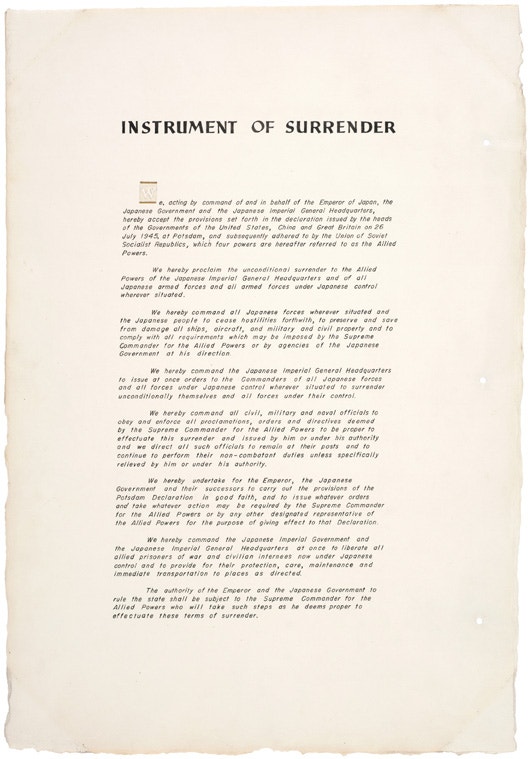Japan’s Role in World War II
August 14, 2015
Today, Japanese Prime Minister Shinzo Abe gave a speech in which he stopped short of actually issuing his own apology for Japan’s aggression in World War II (1939-1945). Abe said he was filled with “deepest remorse” and stated he felt “profound grief” for all those who died in the war. But, he never actually said, “I am sorry.” Why does this matter to people in the countries allied against Japan in the war?

Representatives of Japan signed the official statement of surrender, shown here, aboard the United States battleship Missouri in Tokyo Bay. U.S. President Harry S. Truman declared September 2 as V-J Day, or Victory over Japan Day. (National Archives)
Today marks the 70th anniversary of the end of World War II in the Pacific. (Much of the world marks today as Victory over Japan, or V-J Day. In the United States, September 2 is commemorated. On that date in 1945, representatives of Japan signed the terms of surrender aboard the battleship USS Missouri in Tokyo Bay.) On anniversaries of the agreement to surrender, Japanese prime ministers sometimes issue an apology for the nation’s role in World War II. Experts closely listened to the speech given today by current Prime Minister Abe. He has drawn close scrutiny over this issue because of some of his previous statements and opinions, but also because of his family.
Abe is the grandson of Nobusuke Kishi, a Japanese leader who served as prime minister of Japan from 1957-1960. Kishi’s attitude about World War II and Japan’s role in it was mixed. He was jailed as a war criminal for his role in China in World War II, but released by the Allies. He engaged in revisionist history, as is common among nationalist Japanese politicians. (Such revisionist history in Japan tends to diminish the nation’s role as the aggressor in World War II.) The seeds of today’s anger may be seen in Kishi’s obituary from the August 7, 1985, New York Times. The Times stated that Kishi was “…an ardent nationalist who opposed the war-renouncing Constitution imposed on Japan by the United States in 1947.” Later in the obituary, the paper stated: “That Mr. Kishi had risen to his country’s highest office in 1957, only 12 years after the end of World War II, offered testament to the relative lack of postwar self-recrimination among Japanese – certainly when compared with the internal debates that still hound their wartime allies, the Germans. It would be difficult even now to imagine an accused war criminal, as Mr. Kishi has been, assuming the leadership of either of the Germanies.”
The feeling that Japan has never really come to terms with its role as an aggressor in the conflict of World War II still exists, and Mr. Abe has perhaps encouraged this feeling. He has downplayed the role of Japan in its use of Comfort Women (women from other Asian nations, especially Korea, held in brothels as slaves for use by Japanese soldiers). He has worked for a constitutional change that would allow the Japanese military to play a role in overseas conflicts. Like many of his predecessors in the office of prime minister, Abe has visited a shrine that recognizes former Japanese war criminals as patriots and heroes. All of these acts have Abe’s critics wondering about his goals and motives.
World Book Back in time articles


